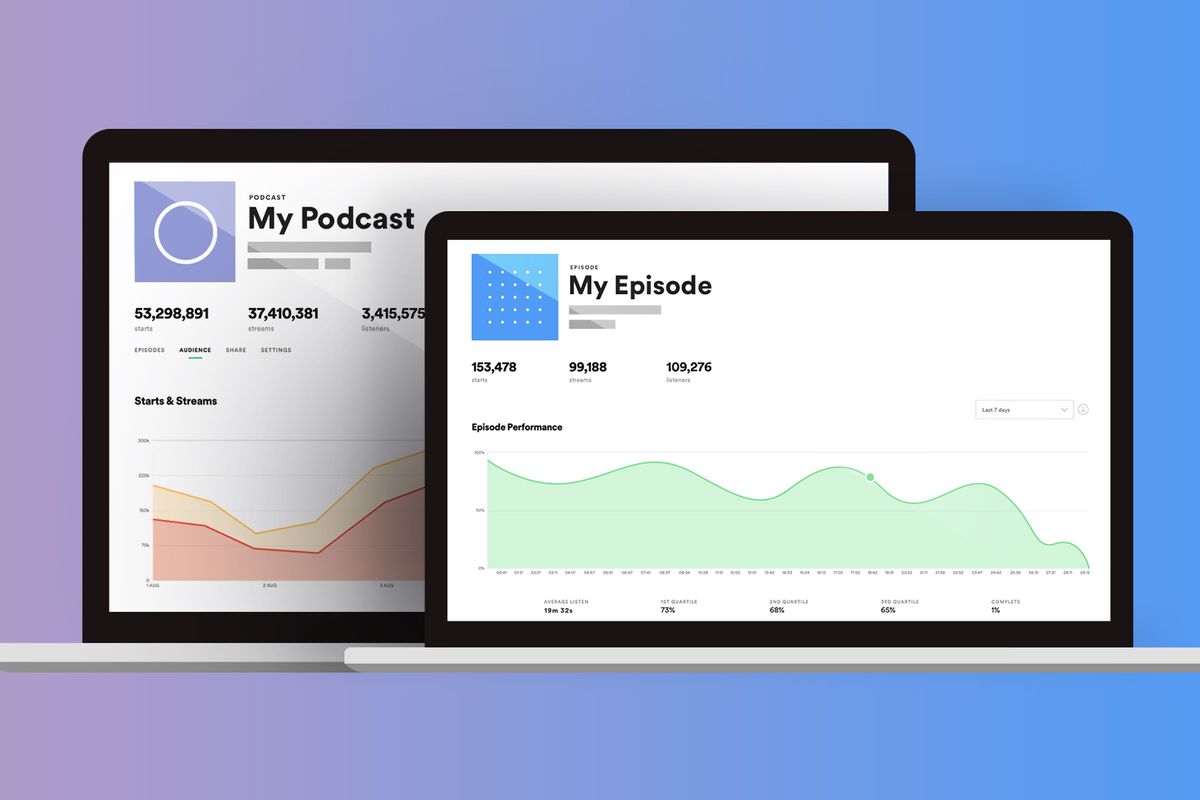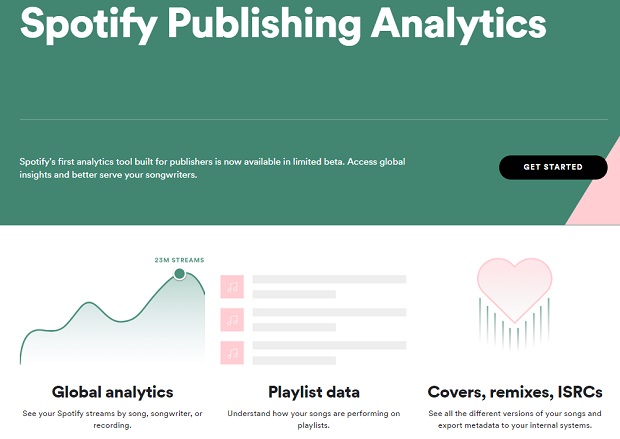As Spotify continues to push its podcasting agenda, bringing its analytics for podcasters out of beta, Eamonn Forde takes a look at why data apps for songwriters and publishers should be more of a priority for DSPs.
The Spotify for Artists app launched in beta in October 2017, offering a new way for artists and managers to understand what is happening with their music on the streaming service.
“We’ve created a one-stop shop to track your new music as it goes live, control your presence on Spotify, and learn more about your listeners,” it said as it launched. “It puts control directly into your hands, whether you’re on the road, in the studio, or wherever, and it works smoothly with the regular Spotify app.”
It was immediately hailed as a game-changer, offering an easily understandable way to harness the data from the millions (or, depending on your size, billions) of streams of tracks. This was Big Data packaged up for acts of all sizes in a way that was inclusive and empowering, offering new insights into what was happening with your music and your listeners.
Earlier that year, in May, AWAL had launched its own app for acts working with the company, an important addition to the arsenal for smaller artists who might not have the data resources of a major label or large independent. “It’s a partner, built to help independent artists find the most important things they need to know –from showing them the cities they’re outperforming in, to benchmarking against their peers, and so much more,” said AWAL on its launch.
Recent weeks have seen things move up a gear, with Apple making its own Apple Music For Artists app available to all, after over a year of beta testing where it was seen as significantly raising the bar in terms of what ways the data could be sliced and diced.
Spotify already has Spotify Publishing Analytics in beta, biding its time for a full release – so it was somewhat surprising when it shifted its efforts onto another data tool for a section of its licensing and content partners that did not even exist a few years ago, quickly taking it out of beta – namely Spotify for Podcasters.
“Because people are logged in and listening every day, Spotify gives you a powerful snapshot of who your listeners are, what episodes they’re streaming the most, and even the music they love — insights that will help you plan future episodes or get sponsors,” it says on its site.“You can also dive deeper into each episode with details around how long people listen and where they start and stop, all while tracking your follower growth.”
Spotify is, if not quite betting the farm on podcasts, certainly seeing them as a huge part of its future. It has spent $404m this year alone buying up podcasting companies, including Anchor, Gimlet Media and Parcast/Cutler Media, as well as signing multi-year exclusive deals with such high-profile names as Barack and Michelle Obama via their Higher Ground Productions podcasting company.
One, if one wanted to be extremely cynical here, could look at the battles Spotify has had in recent years with songwriters and publishers and assume this decision to put podcaster-centric data tools further up the queue than publisher data tools is cut from the same cloth.
“One, if one wanted to be extremely cynical here, could look at the battles Spotify has had in recent years with songwriters and publishers and assume this decision to put podcaster-centric data tools further up the queue than publisher data tools is cut from the same cloth.”
Spotify is unfairly taking all the heat for the pushback against the increase in rates payable to publishers in the US as set by the Copyright Royalty Board (it is far from the only service to oppose them), but some might claim it is not really helping its cause with this genuflecting before the podcasting world and, as such, will read this as yet more proof that Spotify regards publishers and songwriters as, at best, second-class citizens.
While its critics will regard preferential treatment for podcasters as another blow for publishers and songwriters, it has to be balanced against the fact that no other DSP is (even in beta) offering the same sort of data tools as Spotify Publishing Analytics.
Apple Music only has one for artists and there is no news yet on if it will create one for podcasters – despite a structural change in the company that saw it break apart the iTunes app into three separate macOS apps covering podcasts, TV and music. And as the second-largest music streaming service, Apple Music is not yet offering bespoke data tools for publishing.
“Metadata complications and digital hectares of unmatched writing credits make a dedicated tool for publishers much harder to nail down than ones devoted to labels/recording artists and podcasters, but the slow movement here is hardly going to warm the hearts of the publishing world at a time when a charm offensive from DSPs in general and Spotify in particular is desperately needed.”
Metadata complications and digital hectares of unmatched writing credits make a dedicated tool for publishers much harder to nail down than ones devoted to labels/recording artists and podcasters, but the slow movement here – and the internal resources at Spotify diverted into getting one for podcasters airborne so quickly – is hardly going to warm the hearts of the publishing world at a time when a charm offensive from DSPs in general and Spotify in particular is desperately needed.
So while publishers and writers twiddle their thumbs and wait for an invite to the top table, here is a wish list of the things a [insert name of DSP here] For Publishers app could and should look like:
- Tracking covers and live versions: showing the performance of every known cover of a song controlled, even in part, by a publisher to understand which versions and which recording artists deliver the best streaming results.
- Tracking playlists: build and manage playlists (and then get the data from them back) of your compositions as well as understand the playlists that are doing the heaviest lifting for your music, helping writers think of ways to pitch to them.
- Tracking samples: perhaps the hardest data nut to crack due to some artists and labels taking a, let’s say, cavalier approach to sample clearance, but it is still important to provide data if and where possible.
- Tracking podcasts: if Spotify is going to fully launch an app for podcasters, it is only fair that podcasts using music are trackable by the people who actually wrote that music.
- Heatmaps: the standout feature on Apple Music For Artists, this can show where in the world certain songs are taking off and, ergo, this can help inform what markets writers can start to think about collaborating with other writers in, especially as the UK and US dominance in global pop is being chipped away. This can also be used to see what markets are most open to pitching for syncs on TV and adverts.
- Shazam data: something only Apple can provide as it now owns the music-recognition app, but it can offer even more granular and nuanced information than the heatmaps feature.
- Audiences: insight into the types and locations of people listening to songs written by a particular songwriter/songwriting team.
- Official profiles: allowing the creation of writer profiles on DSPs that let you show off who is doing what with your music. Spotify already has Secret Genius, but this could become Public Genius.
- Income: see how much you are making and what you are expected to make as well as identifying where the best earners are (segmented by artist, playlist, market etc.).
For all of this to come to fruition, there is a need to verify writers on DSPs in the same way artists are verified there. Not every writer will want to do this, of course, but it’s wrong to assume that none of them will.
“There is a presumption that writers don’t (and don’t want to) market themselves like recording artists do. But giving them dedicated apps is the first step in changing that thinking and offering them opportunities that were previously unthinkable.”
There is a presumption that writers don’t (and don’t want to) market themselves like recording artists do. But giving them dedicated apps is the first step in changing that thinking and offering them opportunities that were previously unthinkable. If writers are feeling disempowered by moves to cut streaming royalties, the need for them to take a greater proactive role in promoting and marketing their compositions (and understanding how they are being used in a streaming environment) grows ever more important.
If data is the new gold rush, without dedicated data tools across all major DSPs it will not just be in terms of mechanicals that songwriters stand to become shortchanged or impoverished.

